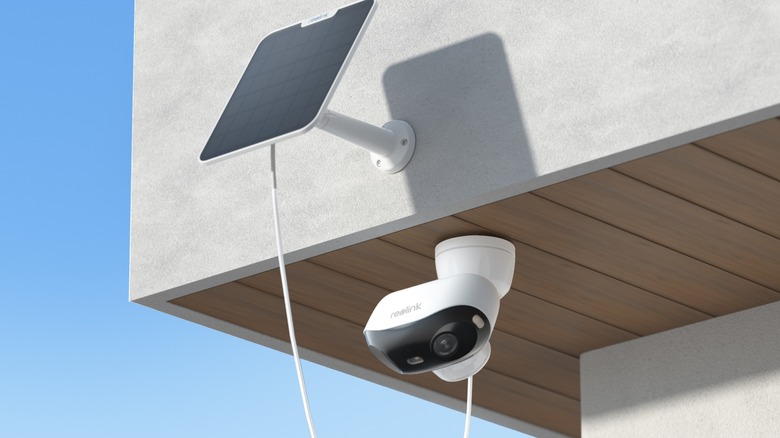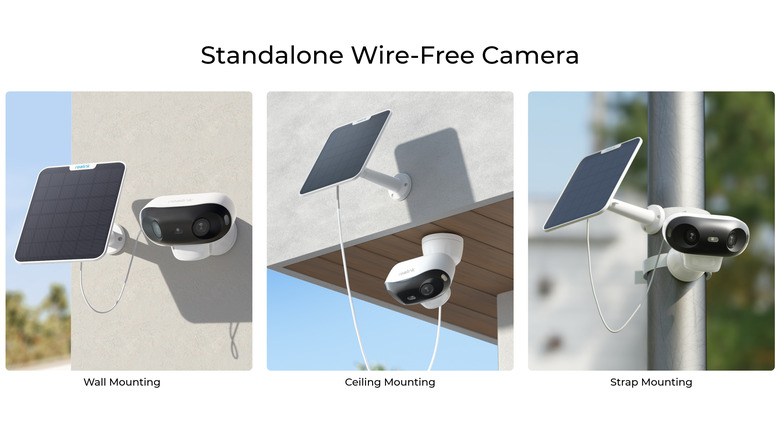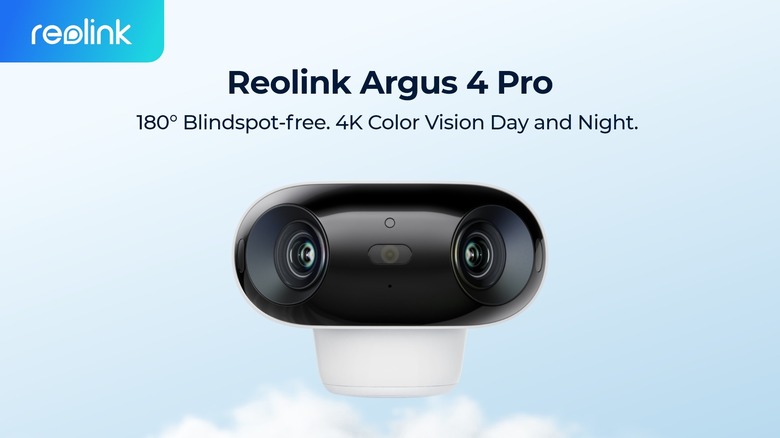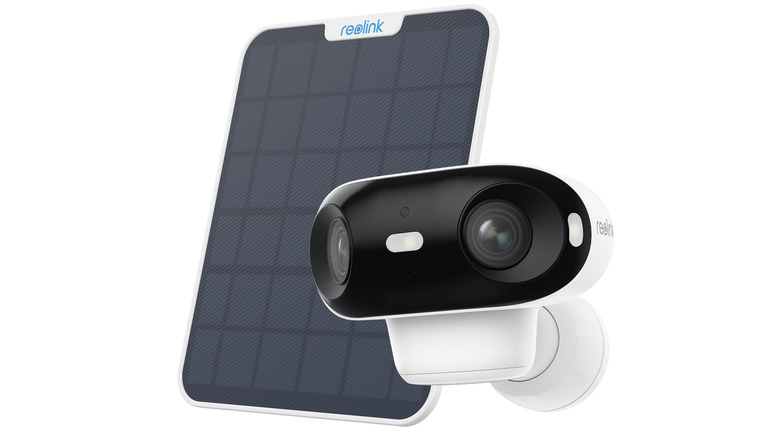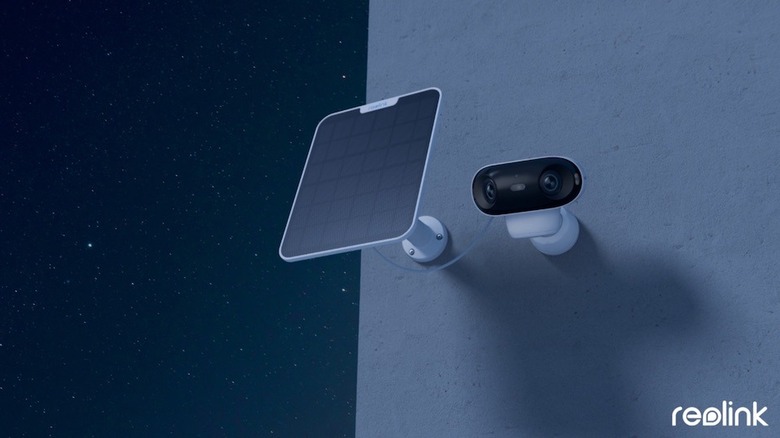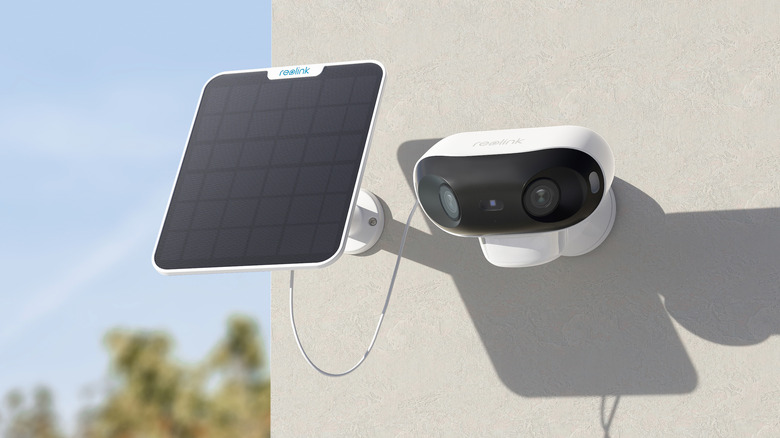Solar-Powered Security Cameras: How To Choose?
Sponsored Content. The sponsor may receive a commission on purchases made from links.
Solar-powered security cameras are now the priority item for home or business surveillance, especially for remote locations and to make installation and powering cameras easier. But before you buy, you should know how to choose the solar-powered camera you need.
In this article, we will discuss what a solar-powered security camera is, how it works, the different types, and the important factors to consider while buying them.
Part 1. Overview of Solar-Powered Security Cameras
1. What is a Solar-Powered Security Camera
A solar-powered camera is not connected to a nearby AC outlet, DC adapter, or Ethernet cable. The camera is powered by solar energy, containing rechargeable batteries that last for a long time once fully charged.
These batteries inside the camera housing are connected to a small solar panel used to maintain charge. During the day, the solar panel automatically charges the batteries, so you can use the camera without any interruption. Anywhere between several minutes to hours of sunlight helps the camera stay charged for the whole day or longer.
For networking, these cameras can use Wi-Fi or 4G LTE, depending on their type. Let's dive into the types of solar-powered security cameras for more details.
Part 2. Types of Solar-Powered Security Cameras
Solar-powered security cameras can be categorized into three types.
1. Wi-Fi Solar Security Camera
This type of camera uses Wi-Fi for networking, and only functions within the Wi-Fi range, but they can still offer excellent security.
The Reolink Argus Pro 4 is the dual-band, Wi-Fi 6 battery-powered camera that offers blazing speeds and stable connection. It is a battery-powered camera, which is 100% wireless and can be powered through a small solar panel. Only 10 minutes of solar charging is enough for the camera to record playback for 24 hours. The best part is that it offers advanced features, like AI smart detection and live playback, without any subscription necessary.
Key Features:
4K UHD 180° Blindspot-Free View: It captures a 180⁰ wide view in 4K and unveils exceptional details in one frame. Its advanced splicing algorithm ensures minimal distortion and no blind spots.
Color Vision Day and Night: Equipped with Reolink ColorX technology. It captures true colors in low-light conditions using the F10 aperture and 1/1.8 sensor. You can enjoy all-day color vision with optimal clarity.
30% More Battery Life: Lasts 30% longer than IR light cameras due to Reolink ColorX technology. It gives up to 12 days of extra standby time.
Enhanced Smart Detection: Detects every movement through a 180° ultra-wide-angle Passive Infrared (PIR) sensor. Analyzes movement patterns with AI and sends real-time accurate alerts.
Easy Installation Anywhere: It is completely wireless, which is the reason it is easy to install anywhere. The 6W Reolink Solar Panel 2 comes with a 4-meter long cable and bracket for quick installation and adjustment.
2. Cellular Solar Security Camera
Cellular security cameras require a SIM card with a data plan to work. They rely on 4G LTE, which is the reason they do not use Wi-Fi connectivity. They are completely wireless cameras and ideal for installation in more remote locations. You can install them in any place within range of cellular service and improve property security.
3. Solar Security Camera System
A solar security camera system consists of multiple cameras covering several angles. If you use multiple Wi-Fi cameras, they can be connected to a Network Video Recorder (NVR) to store all recordings in one place and control all the cameras together.
Since they're charged automatically through solar, several of these cameras working in tandem are excellent for covering a wider outdoor area.
Part 3. What to Consider When Choosing A Solar Security Camera
There are some important factors to consider while choosing a solar-powered security camera.
1. Charging Speed
The charging speed of a solar-powered camera must be considered to ensure continuous operation. The battery should be charged with minimal exposure of the solar panel to sunlight, just like how the Reolink Argus Pro 4 requires only 10 minutes of charging for 24 hours of battery power. Fast charging allows the camera to work without any interruption, even if sunlight is minimal during the day.
2. Outdoor Usage
Solar cameras are used outdoors, so they should also be durable. The housing should be tough enough to withstand small impacts, as well as prevent any attempts at tampering with the camera.
The camera should also be weatherproof and capable of withstanding harsh weather conditions, such as rain and snow. Having an IP66 or IP67 certification is excellent.
3. Long Battery Life
Along with faster charging, solar-powered camera batteries should be able to last for a long time. For instance, after a full charge, the battery should be able to function within a range of 20 days to three months, depending on the type.
That way, the camera can work without interruption, even if there is a power outage on site. Not requiring manual or frequent charging also makes it a convenient security solution.
4. Advanced Function
There should be no compromise on the advanced function of these cameras, despite being solar-powered and battery-operated, as they can ensure constant security. The resolution should be high enough for a clear image, meaning 4K is an excellent choice. The camera should also be able to detect persons, vehicles, and pets smartly and send instant alerts to your device. Most importantly, it should offer remote viewing without any subscription.
5. Good Brand and Reviews
Selecting a good brand should provide reliable service. Check customer reviews, warranty policy, support, etc. Invest in good brands that offer a complete security camera range and accessories.
Part 4. Solar-Powered Security Camera Usage Scenarios
Solar-powered security cameras can be used for a wide range of purposes.
Home Security
They can secure your home's outdoor areas and offer reliable performance when you're away. You can install them with little hassle, and there is no need to worry about recharging intervals.
Urban Surveillance
Urban surveillance also requires a camera that does not need human intervention. A solar camera can be useful for monitoring traffic, roads, public places, etc.
Wildlife and Environmental Monitoring
For the wild, solar-powered cameras are excellent. They do not require wiring, so you can even mount them on a tree. They can capture wildlife and help you monitor the environment and animals day and night.
Remote Locations
These cameras are excellent for remote locations. They work as a standalone device as they are automatically charged, and can work on cellular networks with 4G connectivity — especially in regions where wiring and Wi-Fi are not feasible.
FAQs about Solar-Powered Security Cameras
1. Are solar-powered security cameras worth it?
Yes, solar-powered security cameras are totally worth it. They can charge automatically and offer reliable performance. Just make sure their battery lasts for a long time, especially during times where sunlight is limited.
2. What are the disadvantages of solar cameras?
Solar cameras rely on sunlight. If the panel does not receive adequate sunlight, it won't work or hold charge well, affecting its performance. Secondly, they are not suitable for continuous recording due to the limited battery capacity.
3. Do solar security cameras work at night?
Yes, the cameras have built-in batteries that are charged during the day through the solar panel. Then, they use the battery power to work at night.
4. Can you run a security system on solar power?
Yes, you can run a security system on solar power, but make sure the cameras have an option to do so. They should have batteries in the housing and be compatible with a solar panel. If they are connected to an NVR, you need to power it up from an AC supply. Otherwise, you will need a separate, larger solar panel and an inverter.
Conclusion
Solar-powered security cameras can give you optimal security without the hassle of installation and maintenance. They are automatically charged through a solar panel, there are no wires, and they are extremely easy to install and use. Before you buy one, it's important to understand the different types of solar-powered battery cameras. Consider these factors so you can select the right camera for your needs.
